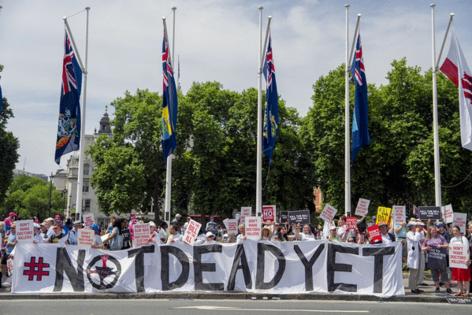UK House of Commons approves legalization of assisted dying
Published in News & Features
LONDON — The U.K.’s House of Commons voted to legalize assisted dying on Friday, in a move that is likely to usher in a significant cultural shift over how to handle the treatment of those with terminal illnesses.
The measure was passed by a 314-to-291 vote following hours of debate in Parliament, when some members shared their own emotional accounts of loved ones suffering through terminal illnesses. It will now have to go through the House of Lords, which could choose to amend it further but historically has tended not to block legislation passed by the elected house.
The so-called private members’ bill, which was put forward by Labour MP Kim Leadbeater rather than Prime Minister Keir Starmer’s government, would allow those with less than six months to live to opt to end their own lives.
It had become an increasingly contentious issue in recent months, with opponents arguing the legislation didn’t have strong enough safeguards to protect vulnerable people from opting for that choice, potentially to ease the burden on their families.
But such concerns were overridden by supporters who said it would give people freedom to choose how to approach the end of their lives. Starmer was among those who voted in favor.
Leadbeater said it would “correct the profound injustices of the status quo and to offer a compassionate and safe choice to terminally ill people who want to make it.”
Crowds of campaigners on both sides of the issue gathered outside Parliament on Friday. Celebrity chef Prue Leith and broadcaster Jonathan Dimbleby appeared in support of the bill, alongside members of the Dignity in Dying campaign who wore pink and held placards in honor of friends and family.
Dimbleby told the Press Association that the bill would mean “millions of people will be able to say to themselves, ‘If I’m terminally ill, I will be able to choose, assuming I am of sound mind and I am not being coerced, to say ‘Yes, I want to be assisted - I have dignity in death’.”
They stood alongside those opposed to the bill, many of whom belonged to religious groups. Some campaigners were dressed as scientists in bloodied lab coats.
Chief executive of Care Not Killing, Gordon Macdonald, said MPs should prioritize improving palliative care. “Most people, when thinking about the practical implications of this, for those most vulnerable, they change their minds,” he said.
The bill passed through a first reading in November with a majority of 55 votes. Several changes were made to the bill in its passage through Parliament, including bans on assisted-dying advertising, replacing a required sign-off from the High Court with one from a panel of experts, and setting up a commissioner to oversee the process.
©2025 Bloomberg L.P. Visit bloomberg.com. Distributed by Tribune Content Agency, LLC.







Comments